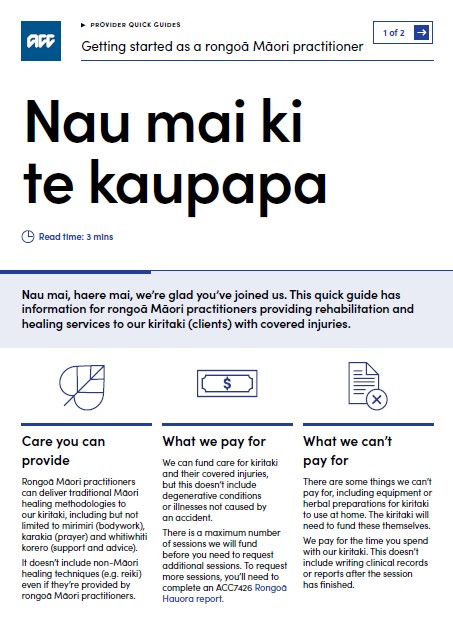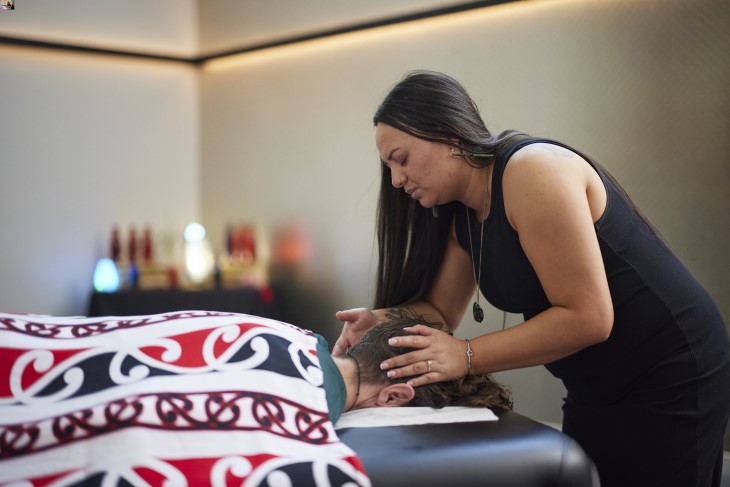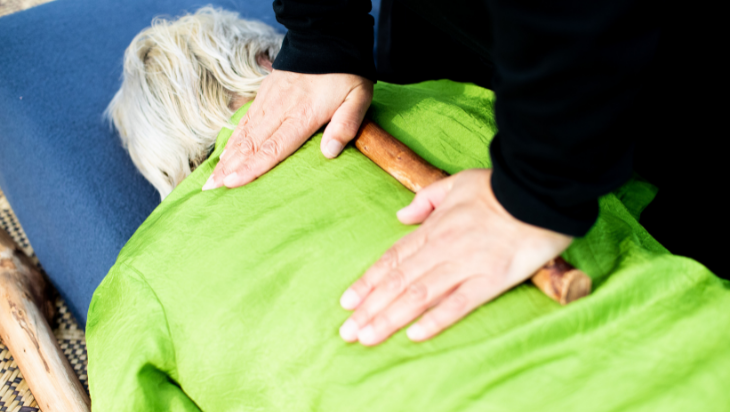Working with us as a rongoā Māori practitioner
Find out how to register with ACC as a rongoā Māori practitioner, how we pay for rongoā Māori services, and how our clients can access these services.
On this page

Quick guide: Rongoā Māori practitioner
This quick guide has information for rongoā Māori practitioners providing rehabilitation services to our clients with covered injuries.
He ringa nā Rongo, he ringa nā te aroha.
The hands of peace are the hands of love.
- Nā Turei Ormsby, mātanga reo
How our kiritaki can use rongoā Māori
Kiritaki (clients) with a covered injury, including a maternal birth injury, can access rongoā Māori as part of their rehabilitation. They can request this through their ACC Recovery team member or contact us:
Phone 0800 101 996
Email claims@acc.co.nz
We’ll talk to them about how their injury is affecting them and how they expect rongoā will help their rehabilitation. Kiritaki (clients) don’t need a referral from a treatment provider, although clinicians may choose to support their request.
We don't refer our kiritaki (clients) to a specific practitioner for rongoā Māori services. When requesting rongoā Māori, kiritaki (clients) need to tell us which practitioner they would like to see. We must approve their request before they can start their rongoā Māori rehabilitation.
How we pay for rongoā Māori
Rongoā Māori as social rehabilitation
We pay for rongoā Māori under the ‘other social rehabilitation’ category of our legislation. This is separate from treatment, which is why you'll hear us refer to rongoā as rehabilitation and not treatment.
Rongoā Māori may be used on its own or together with other services, depending on the needs of each kiritaki (clients).
Social rehabilitation services aim to improve the functional capability of our kiritaki (clients), to help them return to independence – whatever that looks like for them, e.g. carrying out daily tasks, contributing to whānau and community.
Rongoā Māori services for maternal birth injuries
We also fund rongoā Māori to support kiritaki (clients) with a covered maternal birth injury.
This is an optional contract. Rongoā Māori practitioners do not have to sign up to the contract to deliver care for a covered birth injury claim; they may instead choose to work with māmā under the social rehabilitation framework.
To sign up to the Maternal Birth Injuries contract, rongoā Māori practitioners need to be registered as an ACC rongoā Māori vendor. Additional provider registration and application forms are required for the Maternal Birth Injuries contract – these are outlined below:
- ACC8429 Rongoā Provider Registration form
- ACC8428 Rongoā Māori Annual Declaration form
- Any additional forms, e.g. ACC Children’s Worker Safety Check forms
Please contact our team if you’d like more information about the contract.
Email maternalbirthinjuries@acc.co.nz
Paying rongoā Māori practitioners
For social rehabilitation services:
For rongoā Māori delivered as social rehabilitation, we pay using one-off agreements. You must register with us as a vendor so that you can invoice us for approved services.
We’ll support the cost of rongoā Māori services up to a maximum amount. We expect you to charge your normal rates for rongoā Māori services. In some cases, we may pay part of the cost rather than paying the full amount.
The number of hours we’ll approve is on a case-by-case basis, according to the social rehabilitation needs of each kiritaki (clients). This depends on the complexity of their injury and the rehabilitation outcome that they’re wanting to achieve.
Kiritaki (clients) can request more sessions if they need more rehabilitation. This may require a practitioner to complete an ACC7426 Rongoā Hauora report.
For maternal birth injury services:
Practitioners working under the Maternal Birth Injuries contract should invoice ACC using the relevant service item codes set out in the service schedule (found in your contract).
The service schedule tells you what we will pay for and includes:
- whakawhanaungatanga (building connections and relationships)
- whitiwhiti kōrero (support and advice)
- wānanga (group sessions)
- mirimiri and romiromi (bodywork)
- hōmiri (sound healing).
You can provide up to 16 approved initial sessions for a covered birth injury before needing to submit an ACC8427 Rongoā Māori Assessment form.
How to work with us
If you want to register with us to provide rongoā Māori services to kiritaki (clients), there’s a few requirements you must meet first.
Register to work with us
You must register with us as a vendor to provide rongoā Māori services to our kiritaki (clients).
As part of your registration, we need you to complete the ACC7425 form.
This form will ask you for:
- the whakapapa (origins) of your mātauranga (knowledge)
- details of your experience (we require at least five years’ experience working in the community)
- evidence of support for the services you provide from mana whenua (tribal authority) of the rohe (region) you work in
- endorsement from your rongoā mentor that supports your practice and lived experience
- details relating to a Police check.
All health and disability service providers in Aotearoa New Zealand, including rongoā Māori practitioners, must follow the Health and Disability Services Consumers’ Rights code.
Code of Health and Disability Services Consumers’ Rights
Watch this short video to walk you through the registration process.
What you need to do to register:
- Complete the ACC111 vendor registration form (either online or via email)
- Register online as an ACC vendor
- Download the form and email it to us:
Register as a vendor or supplier (ACC111)
- Complete the ACC7425 Tell us about yourself form and email it to us.
- Complete the Police Vetting Consent form (page 3 and 4) available online at New Zealand Police Forms and Guides.
Once we receive your forms, we'll review and assess your application. We may audit registered vendors at any time.
Overview of the registration process
You can contact us with questions about your registration:
Email registrations@acc.co.nz
Once registered, you can apply for the Maternal Birth Injuries contract.
Working with us - practitioner resources
To support you in working with us, we have developed some practical resources that cover what you need to know about providing rongoā services to ACC kiritaki (clients).

Video: Working with us
Watch our onboarding video to become familiar with our processes and approaches.

Rongoa Practitioner Handbook
A guide rongoā Māori practitioners, covering practical information about working with us and who to contact if you need support.
Working with kiritaki
We make decisions about funding requests for rongoā Māori on a case-by-case basis. Before you start to work with kiritaki (clients), please first confirm:
- they have a covered injury
- their need for rongoā relates to that injury and not another condition
- if providing services as social rehabilitation, that you have received a Purchase Order from our Recovery team confirming details of the approved rongoā Māori sessions.
Once you’ve provided all approved rongoā Māori sessions to your kiritaki (clients), you need to complete a Hauora report and invoice us.
Refer to the practitioner handbook, Mahi Tahi, for more details on this and our expectations and policies.
Rongoā Hauora report (ACC7426)
Rongoā Māori to support wellbeing for ACC kaimahi
In 2022, ACC began offering rongoā Māori as a service to support the wellbeing of ACC kaimahi. ACC-registered practitioners provide this service to our kaimahi across the motu.
More information is available in the Mahi Tahi handbook.
Contact us
If you have questions about rongoā Māori at ACC, complete the form below.